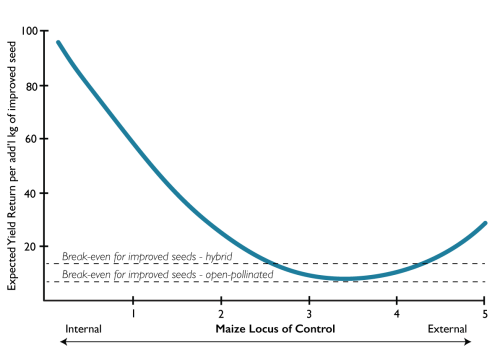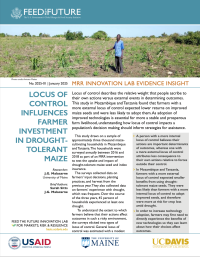Locus of control describes the relative weight that people ascribe to their own actions versus external events in determining outcomes. This study in Mozambique and Tanzania found that farmers with a more external locus of control expected lower returns on improved maize seeds and were less likely to adopt them. As adoption of improved technologies is essential for more a stable and prosperous farm livelihood, understanding how locus of control impacts a population’s decision making should inform strategies for assistance.

This study draws on a sample of approximately three thousand maize-cultivating households in Mozambique and Tanzania. The households were surveyed annually between 2016 and 2018 as part of an MRR intervention to test the uptake and impact of drought-tolerant maize seed and index insurance.
The surveys collected data on farmers’ input decisions, planting practices, and harvest from the previous year. They also collected data on farmers’ experience with drought, which was frequent. Over the course of the three years, 45 percent of households experienced at least one drought.
Highlights
- A person with a more internal locus of control believes their actions are important determinants of outcomes, whereas someone with a more external locus of control attributes less consequence to their own actions relative to forces outside of their control.
- In Mozambique and Tanzania, farmers with a more external locus of control expected smaller benefits from using drought-tolerant maize seeds. They were less likely to adopt the improved seeds than farmers with a more internal locus of control and therefore were more at risk for crop loss amid drought.
- In order to increase technology adoption, farmers may first need to directly experience the benefits of new technologies so they can learn about how their choices affect outcomes.
To understand the extent to which farmers believe that their actions affect outcomes in such a risky environment, the surveys elicited two types of locus of control. General locus of control was estimated with a modest adaptation of the standard Levenson IPC scale.i An instrument to estimate maize-specific locus of control was also developed, using a hypothetical yield projection activity.
Lower Expected Returns
Consistent with the perspective that actions that their actions have less influence on outcomes than forces outside of their control, farmers with a more external locus of control expected harvest to increase less with each additional kilogram of seed than their more internally oriented peers. As shown in Figure 1, the expected return from using improved seed varieties falls below the break-even point, which would justify the higher cost of the seed compared to planting local varieties, for farmers with the most external locus of control. In contrast, those with a more internal locus of control tended to expect increases in harvest that were several times higher than the break-even point.
Unsurprisingly, those with a more external locus of control, who expected less from the seed, were also less likely to invest in it. Farmers in the most external third of the maize-specific locus of control were up to 11 percentage points less likely to use improved maize varieties than the most internal third. This effect was also present, though smaller in magnitude, when using the general locus of control measure.

Lived Experience

The story is, unfortunately, not simply one of foregone benefits but also of continued exposure to harm. Over the period of study, drought tolerant maize seed was successful in almost completely offsetting the losses associated with moderate, mid-season drought.ii Households that did not adopt drought-tolerant seeds remained exposed to this risk. Suffering recurrent shocks may strengthen the belief that external forces are the primary determinant of outcomes, creating a cycle in which efforts to safeguard agricultural production by promoting resilience-enhancing technologies struggle to reach vulnerable households.
To overcome this challenge in promoting technology uptake, it may be necessary to look beyond interventions that target traditional barriers of insufficient access. Farmers may require education, direct experience, and time in order to shift their control beliefs internally. Only after farmers’ locus of control starts to shift more internally can broad adoption of new risk management technologies be expected.
i Levenson, H. 1981. “Differentiating among Internality, Powerful Others, and Chance.” In H. Lefcourt (Ed.), Research with the Locus of Control Construct, 15-63.
ii Boucher, S.R., Carter, M.R., Flatnes, J.E., Lybbert, T.J., Malacarne, J.G., Mareyna, P.P., Paul, L.A. 2024. “Bundling Genetic and Financial Technologies for More Resilient and Productive Small-Scale Farmers in Africa.” The Economic Journal, 134 (662): 2321-2350.

